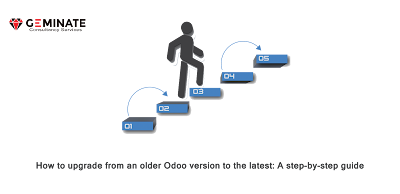A feature of the annual Odoo festival is the introduction of the new Odoo version, which includes presentations from Odoo as well as clients and partners regarding certifications, success stories, and challenging implementations.This year, we'll learn about Odoo 15 for the first time.
Are you currently using Odoo14 or an older version and unsure whether or not you should upgrade?
Why should you upgrade to the most recent version?
There are a variety of reasons why businesses choose to upgrade to a new version of Odoo.
Let's have a look at the three key reasons:
New features, functions, modules, and integrations have been added.
The most recently updated and enhanced modules, features, and integrations are undoubtedly one of the most significant benefits that the new version of Odoo delivers every year.
Odoo keeps up with the times and releases two to four new modules per year, each with a far more user-friendly interface and interfaces with other applications (e.g. Outlook integration for CRM in version 15).If you're interested in learning more about the additional features of Odoo 15 compared to its predecessor, check out our post on the subject.
System that is faster, slicker, and more user-friendly
Odoo improves its speed in both the front-end and back-end with each new release.On average, Odoo 13's back-end is about 5 times faster than prior versions! The front-end of Odoo 14 is almost 3.5 times faster than version 13!Page speed is one of the most significant criteria for better search engine optimization (SEO) of your website, so this enhancement is greatly appreciated by all marketers.
Odoo provides bug fixes and functional support.
Odoo only supports the three most recent versions of its clients.Your system will not be upgraded with any updates, bug patches, or functional support if you are using Odoo Enterprise 11 or older.
Process of Odoo Migration
Once you've decided to migrate from an earlier version of Odoo to a newer one, you'll need to answer the following questions to establish the best migration strategy.
Do you have any custom or third-party Odoo modules?
What kind of server hosting service do you use?
What version of your system do you have?
Which is more important: business or community?
What is the difference between your system's original and target versions?
The answers to these questions will assist you in determining the best migration approach and scheduling the work required for your Odoo migration.In any case, you should determine which actions from the list below are required for your system.
Examine the new system, its modifications, and its rigorous features.
Odoo evolves and improves with each new release.It introduces new functionality, and it's critical to understand how these changes affect the system and current features.If you're using an older version, chances are you'll have to customize it in your system because some features aren't available.
However, this functionality may have been introduced to the latest version as a result of customer input.
During each migration, it's critical to compare your custom modules and what they add/change in the system to the new Odoo capabilities.It aids in the removal of stiff modules that are no longer required in your system.This technique can save you money (since you won't have to upgrade the customized modules) and make your users' lives easier (because they won't see redundant information and fields, for example).
It may be necessary to tweak your company's process from time to time, but the less you modify your system, the better.
Customization and third-party modules should be upgraded.
It's time to update the code once you've determined which custom modules need to be changed in the newer old version.Some modules can be used nearly immediately (with only minor changes to the manifest file), while others may require more extensive modifications.
It always depends on the Odoo version you're using and which modules you're upgrading.As an example, we can look at the accounting and invoicing functionalities in Odoo 12 and Odoo 13.
Odoo rewrote the logic of invoices and journal entries in version 13 and combined the two models/documents into one.It made significant enhancements, such as allowing users to review drought journal entries before posting them.
All modules that dealt with bills or journal entries, on the other hand, had to be entirely rebuilt.
Because some modifications are minor and others are more complex, it is necessary to do technical analysis to establish which group they belong to.
If you're using an Odoo store-purchased 3rd party module, you'll need to repurchase it because you require it for a newer version.
Your Odoo database need be upgraded.
You should be ready to upgrade your database once you've verified that your customization have been upgraded, you've decided not to use them anymore, or you don't have any custom modules installed in your database.Depending on the hosting solution you're using, the upgrade process may differ.
Please note that only Odoo Enterprise databases (which are included in the Odoo license) can be migrated, and you can choose to migrate only to presently support versions (the 3 most recent versions).However, upgrading to the most recent version is usually the best option.
On-premise, in your own cloud, or with your Odoo partner's hosting
If you're handling your Odoo hosting on your own, you have two options:
Use the Odoo migration script to migrate your data.
To launch the migration script, simply type this script into your server's console.The migrated database will be generated on your server if the migration is successful. You will receive an error log if there are any issues with the script, which are usually due to the characteristics of your database (usually caused by custom modules), and you will need to file a ticket to Odoo to solve and improve the migration script.
Upload your database dump to the Odoo website.
If you find the first approach too technical, you may always upload a database dump to the Odoo website.Odoo will perform the migration script on their end, troubleshoot any issues, and send you an improved database for testing.
Odoo hosting on Odoo.sh
If you're utilizing Odoo.sh as your hosting service, you'll need to upload a database dump to the Odoo website.Odoo will perform the migration script and provide you with a migrated database that you may use as a staging environment.The entire procedure is covered in the official Odoo.sh migration documentation.
Odoo hosting on Odoo SAAS/Odoo Cloud
If you're a customer of Odoo SAAS, this indicates that:
You don't have any third-party modules or customization in your system (Odoo Studio customization and "technical settings" don't count because they're stored directly in the database and don't affect the code).
You have access to free web hosting.
The upgrading process is rather simple because external modules do not add any complexity to your system.
What is the time frame to migrate to a new Odoo version?
The answer to this question may vary depending on a variety of factors, including:
What is your Odoo version right now?
What is the version to which you want to upgrade?
When do you want the migration to happen?
How many and how complicated are the customizations in your system?
For minor to larger installations, we recommend planning at least 1-2 months ahead of time.
You have some time to complete your study and prepare the migration because the migration script normally matures between 4-6 months of its release.It's not a good idea to start using a new version of Odoo right away after it's been released.
The migration procedure is normally a stand-alone project for larger implementations, and it can take 3-4 months to complete.
What is the best time to migrate to a new version?
Upgrading to a newer version of Odoo is always a trade-off between costs and benefits.To ensure that you are always utilizing a supported version of Odoo, we recommend upgrading at least once every three years (as mentioned above, Odoo supports only the latest 3 versions of the system).
However, upgrading Odoo more frequently may be beneficial, particularly in the following situations:
There are no custom modules or third-party programmed installed (or you have a very limited amount of them with low complexity)A new feature has been added that will greatly simplify your procedure or automate operations that are now done manually.You're having problems with your computer's performance.
While utilizing Odoo Community, upgrading to a new version is possible.
The free system upgrade is only available to Odoo Enterprise users.You won't get any help or a script to upgrade your database if you use Odoo Community. Despite the upgrade of your database can be handled in a variety of ways, the process with the first two steps (analysis of the changes, upgrading of the custom modules) of the migration is the same.
Odoo Enterprise is a better option.
Before you begin your migration to the current version, the quickest and most painless alternative is to upgrade your Odoo Community to Odoo Enterprise.Because free upgrades are included in the Odoo license, you can save a lot of money and effort, especially if you only have a few internal users.
A multi-year subscription can be less expensive than writing your own Odoo Community migration script.
Do a clean implementation once more.
A standalone implementation of the newest version is another alternative, which is generally ideal for smaller systems (smaller in terms of scope - a small number of basic apps or base Odoo) and enterprises who are running very old versions of the system.
A fresh look at the new features will often reveal that you don't need to migrate a large number of custom modules and that the standard Odoo features can manage additional operations.
What matters in this technique is figuring out how to establish the best data migration plan.
Make your own script for migration.
For larger, more complex, and customized systems that you don't want to upgrade to version Enterprise for various reasons (typically systems with a large number of internal users), the best solution is to write your own database migration script that will transfer and prepare the data for the new version.We recommend contacting a seasoned Odoo partner with at least 3-4 years of Odoo expertise and a track record of successful migrations.
Do you require assistance with your migration?
Due to a lack of familiarity with Odoo upgrades, migrating to a new version can be a time-consuming and error-prone operation.Our advisors are available to discuss your situation, conduct an analysis, offer the best migration approach, and assist you in beginning to reap the benefits of the most recent version.
If you're thinking about upgrading to a newer version of Odoo, don't hesitate to contact us!



